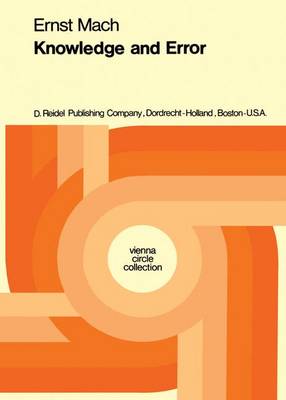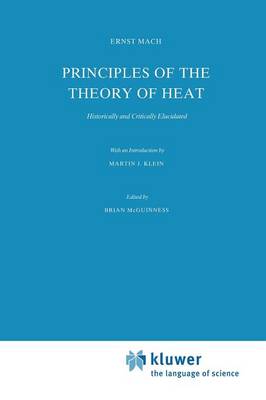Vienna Circle Collection
2 primary works
Book 3
Erkenntnis und Irrtum. Skizzen zur Psychologie der Forschung. Von E. MACH Emer. Professor an der Unlversltlt Wlen. LEIPZIG Verlag von Johann Ambrosius Barth 1905. INTRODUCTION XIII On a number of occasions Mach expressed the sentiment, especially in his correspondence, that America was the land of intellectual freedom and opportunity, the coming frontier for a new radical empiricism that would help to wash metaphysics out of philosophy. In 1901 he sponsored the German edition of Concepts and Theories of Modern Physics (1881) 2 by J. B. Stallo, Cincinnati lawyer and philosopher. Mach warmly endorsed Stallo's book because his scientific aims so closely approximated his own, and because Stallo rejected the latent metaphysical elements and concealed ontological assumptions of the mechanical-atomistic inter- pretation of the world. The second edition of Wiirmelehre was dedicated to Stallo in 1900. The fourth edition of Populiir-wissenschaftliche Vorlesungen (1910), containing seven new essays, was dedicated to Harvard Professor of physiology, philosophY, and psychology, William James.
Mach had a strong intellectual affinity for James' pragmatism because, like himself, he recognized that James had come to radically empirical views from science. Both men took pure pre-conceptualized experience, from which the mental and physical predicates of experience are composed, to be neutral rather than real, unreal, objective or subjective.
Mach had a strong intellectual affinity for James' pragmatism because, like himself, he recognized that James had come to radically empirical views from science. Both men took pure pre-conceptualized experience, from which the mental and physical predicates of experience are composed, to be neutral rather than real, unreal, objective or subjective.
Book 17
xi should hope for "first and foremost" from any historical investigation, including his own, was that "it may not be too tedious. " II That hope is generally realized in Mach's historical writings, most of which are as lively and interesting now as they were when they appeared. Mach did not follow any existing model of historical or philosophical or scientific exposition, but went at things his own way combining the various approaches as needed to reach the goals he set for himself. When he is at his best we get a sense of the Mach whom William James met on a visit to Prague, the Mach whose four hours of "unforgettable conversation" gave the forty year old, well traveled James the strongest "impression of pure intellectual genius" he had yet received, and whose "absolute simplicity of manner and winningness of smile" captivated him completely. 12 Consider, for example, the first few chapters of this book, Principles of the Theory of Heat, which Mach devotes to the notion of temperature, that most fundamental of all thermal concepts. He begins by trying to trace the path that leads from our sensations of hot and cold to a numerical temperature scale.

